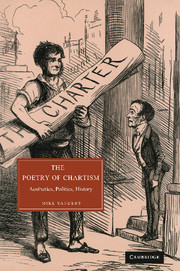Book contents
- Frontmatter
- Contents
- Acknowledgements
- CAMBRIDGE STUDIES IN NINETEENTH-CENTURY LITERATURE AND CULTURE
- Introduction
- 1 The Chartist imaginary: ‘talking by turns of politics and poetry’
- 2 Chartist poetry and literary history
- 3 ‘A jackass load of poetry’: the Northern Star's poetry column 1838–1852
- 4 Insurrectionary sonnets: the ideological afterlife of the Newport uprising
- 5 ‘Merry England’: memory and nostalgia in the year of the mass strike
- 6 ‘The future-hastening storm’: Chartist poetry in 1848
- 7 Constellating Chartist poetry: Gerald Massey, Walter Benjamin and the uses of messianism
- Appendix A Three Chartist poems
- Appendix B Details of poetry published in the poetry column of the Northern Star
- Bibliography
- Index
Introduction
Published online by Cambridge University Press: 11 July 2009
- Frontmatter
- Contents
- Acknowledgements
- CAMBRIDGE STUDIES IN NINETEENTH-CENTURY LITERATURE AND CULTURE
- Introduction
- 1 The Chartist imaginary: ‘talking by turns of politics and poetry’
- 2 Chartist poetry and literary history
- 3 ‘A jackass load of poetry’: the Northern Star's poetry column 1838–1852
- 4 Insurrectionary sonnets: the ideological afterlife of the Newport uprising
- 5 ‘Merry England’: memory and nostalgia in the year of the mass strike
- 6 ‘The future-hastening storm’: Chartist poetry in 1848
- 7 Constellating Chartist poetry: Gerald Massey, Walter Benjamin and the uses of messianism
- Appendix A Three Chartist poems
- Appendix B Details of poetry published in the poetry column of the Northern Star
- Bibliography
- Index
Summary
The Northern Star's poetry column for 18 May 1839, carries a factory reform poem written by a woman known to history only as E. H., ‘a Factory Girl of Stalybridge’. In this poem entitled, ‘On Joseph Rayner Stephens’, E. H. compares her position with that of the millowners' children and wives. The contrast she draws between their advantages purchased, she believes, at the cost of her own class's impoverishment is a common rhetorical device in early Victorian social discourse. Less familiar, perhaps, is the content of this trope, for E. H. protests her cultural deprivation as bitterly as any material deprivation:
Their children, too, to school must be sent,
Till all kinds of learning and music have learnt;
Their wives must have veils, silks dresses, and cloaks,
And some who support them can't get linsey coats.
Two stanzas later E. H. returns to the question of cultural entitlement – ‘If they had sent us to school, better rhyme we could make, / And I think it is time we had some of their cake’. In this simple rhyming couplet E. H. attests to poetry's importance in the working-class movement. Here poetry is figured as a luxury rather than a fundamental necessity – cake rather than bread – but nonetheless it is something to which E. H. believes she is entitled. In her imagination, poetry equates with plenty; it signifies the desire for ‘something more’, the ‘something better’ which impelled Chartism.
- Type
- Chapter
- Information
- The Poetry of ChartismAesthetics, Politics, History, pp. 1 - 5Publisher: Cambridge University PressPrint publication year: 2009

